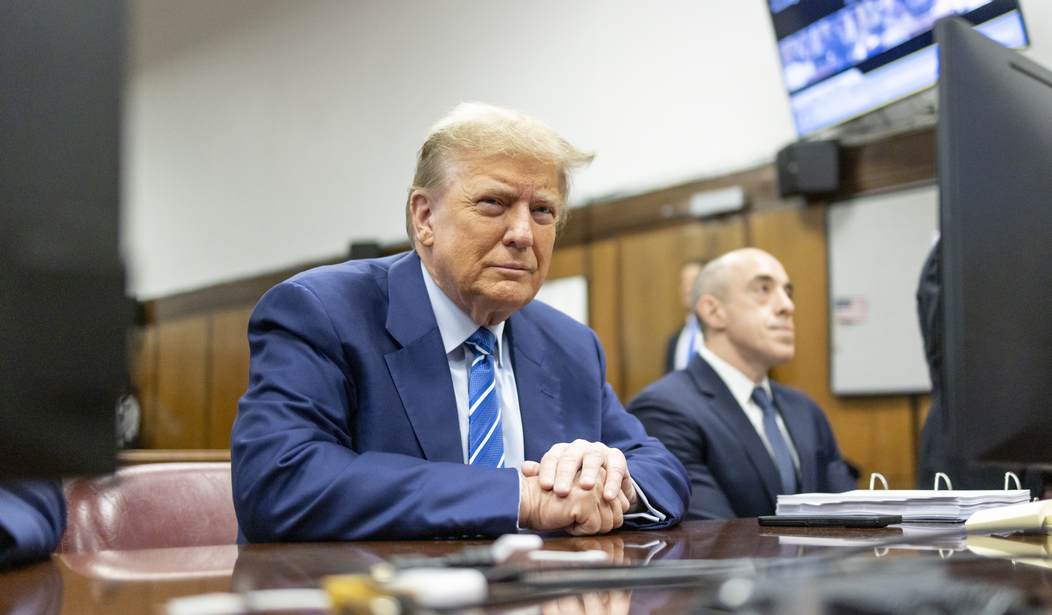The first witness in the Trump trial was called to the stand on April 22. Since then, the bulk of the legal eagles dissecting the case, myself included, still have not been able to connect the dots between the stated charges and any evidence in support of them.
Why is that?
A few reasons.
Unlike in “normal” trials with “normal” defendants where the existence of a crime, any crime, is a given, the prosecution here never had a clear plan for proving the most important component – namely, the underlying predicate crime which must exist for any of these thirty-four charges to reach felony status.
In the months prior to jury selection, Bragg clutched a ball to his chest and proclaimed he didn’t need to show that the most famous defendant of his career actually “committed or concealed” another crime – as the very statute dictates – but rather that the former president merely “intended” to commit or conceal some other crime when he authorized payments to his then-lawyer totaling $130,000, calling them, wait for it, “legal fees.”
Bragg is wrong.
It wasn’t until the jury was seated that Bragg’s team finally picked a lane.
In his opening statement, prosecutor Matthew Colangelo -- whose resume includes paid political consulting for the DNC, and a stint as principal deputy associate attorney general for the Biden DOJ -- looked the jury in the eye and told them he would prove Donald Trump conspired unlawfully to “interfere” with the 2016 election.
The “interference” at issue is Trump’s desire to minimize the damage to his reputation which had been threatened by a salacious story of a gold-digging porn-star and her smut-brokering attorney.
Recommended
What Colangelo was describing in the quintessential nebula is a low level, state election law violation (one that is, itself, long-barred by the two-year statute of limitations).
There’s just one, small problem with Bragg’s plan.
Of all the ways one can conspire to break this law, defending one’s reputation against extortionist or otherwise embarrassing claims is not on the list. A person never loses the right to buck against reputational injury, whether running for president of the country, or president of the PTA.
Instead, this low-level state election law contemplates a host of other acts one can employ to “prevent or promote” another from public office, such as taking a baseball bat to a polling place, pulling the fire alarm or sending out voting information with the wrong date in hopes the opposing candidate’s people fail to show up.
Unfortunately for Bragg, there isn’t a bootstrap strong enough to overcome one conveniently overlooked point: Donald Trump was not running for dog catcher. Nor was he running for mayor, or even governor of the state. Trump was running for the highest federal position in all the land. As such, New York’s little misdemeanor law does not apply.
Are you with me?
If the underlying “predicate” crime – the one that is absolutely necessary to elevate the thirty-two-would-be-misdemeanor charges to thirty-two felonies -- is factually and legally inapplicable, (and frankly, wholly unsupported even if not time-barred), then what are we doing here?
Bragg’s entire prosecutorial strategy is to prove a crime that did not happen, did. And how is he proving it? Well, because he says so, that’s how.
Bragg’s plan all along has been to present an unsubstantiated case before his jury and get them to a guilty verdict simply because Bragg proclaims a series of innocent acts to be criminal. If this doesn’t smack of prosecutorial misconduct, I don’t know what does.
So, what’s next?
Michael Cohen. Cohen is the convicted felon, one-time lawyer to Donald Trump, now disbarred and making a living defaming Trump through a microphone on the regular. He is also the cornerstone of this house-of-cards case.
There is nothing Michael Cohen is going to be able to say to breathe any sort of life into a case that was as dead-on-arrival as this one.
Not because Cohen is a noted liar. Not because he has an axe to grind. And not because he violated his oath of confidentiality to his biggest client ever.
Cohen will not get prosecutors any closer to a conviction because nothing Donald Trump did was a crime. For this reason, it makes perfect sense for the prosecution to save the worst for last.
This case is an abuse of discretion, process and authority at a level never seen. The prosecution is undeterred, and the judge, winking and nodding in Bragg’s direction with every ruling.
If that doesn’t scare the pants off you —then all I can say is watch out. You’re next.
Jonna Spilbor is an attorney, radio host and legal commentator appearing frequently on Fox News, Court-TV, the Law and Crime Network, Oxygen and other outlets. Licensed in New York, California, and the District of Columbia, Jonna maintains offices in New York City and the Hudson Valley.

























Join the conversation as a VIP Member